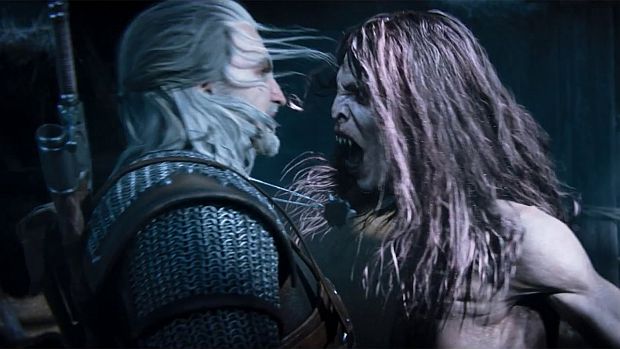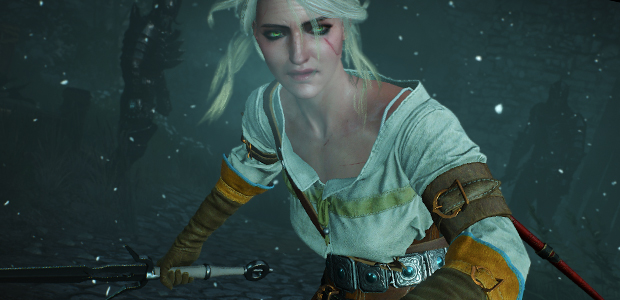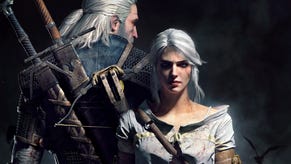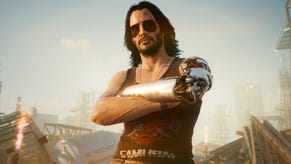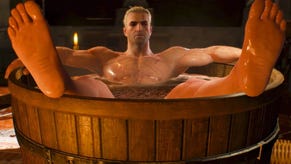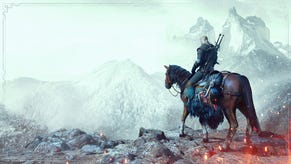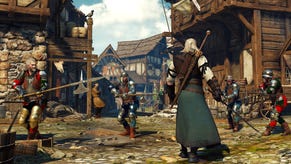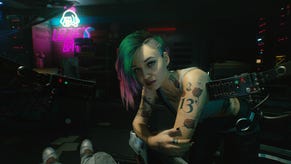The RPS Advent Calendar, Dec 22nd: The Witcher 3
2015's best open world game!
What is the best open world game of 2015? The RPS Advent Calendar highlights our favourite games from throughout the year, and behind today's door is...
Adam: I try to go into every game with an open mind but the previous Witcher games made that awfully difficult when it came to The Wild Hunt. To give them their due, both were games that I came to late, with a clutter of opinions already piled up in my head. I didn't persevere with them and perhaps my attitude toward them isn't entirely dissimilar to Graham's regarding The Witcher 3 (which you can read below). They both had qualities that I admired but those qualities were drowning in a whole mire of RPG systems, characters and sex-cards that I couldn't bring myself to care about.
Without realising, I filed the Witcher games on the same shelf as all of those big fantasy novel series that I'm always surprised that people can find the time to enjoy. Even if I can understand the appeal, I'd rather spread my leisure time around rather than pouring so much of it into a single fictional universe. The Witcher games might not have asked for a lifetime's devotion but in the time that I could have watched a couple of films, they didn't manage to convince me the next thirty or forty hours of their company would be worthwhile.
And so, as I've written about already, I took some convincing when people told me that this was the one. Now, here I am telling you that this really is the one. We gave Pillars of Eternity pride of place in our Best RPG window this year and that's because so much that is good about The Witcher 3 isn't directly related to its genre. Its combat and leveling systems don't thrill me, and inventory management and looting feel a little too much like working in a sorting office. There's no character creation, Geralt being the star of the show again, and while you can make him *your* Geralt to an extent, he's a pre-defined role to play rather than one of your own choosing.
The Witcher 3 is the most revolutionary game of the year in some respects though, for one simple reason. It fixed fetch quests. Hell, it might have fixed the idea of questing entirely.
In writing this, I was reminded of something another developer said earlier this year. Swen Vincke, CEO of Larian, was explaining the competitive cooperative play in the studio's upcoming Divinity: Original Sin 2. He used the word 'quest' to describe something that was happening on-screen and then corrected himself: "It's a situation, not a quest. A quest implies a definite objective, a situation tells you to be reactive and to improvise.” I liked that. I still do. Divinity is a game driven by systems, a game that invites players on stage and asks them to form an improv group.
CD Projekt RED take the notion of quests, as traditionally understood, and make it new. There are definite objectives, often related to the monster-hunting and -killing that is Geralt's profession, but almost every objective marker in the game reveals aspects of the world previously unseen. Structurally, many of the quests still follow recognisable patterns: go to point A, speak to quest-giver, follow instruction B, kill enemy C at point D. Sometimes you're collecting objects instead of killing monsters and sometimes you're making decisions along the way, but the brilliance of The Witcher 3 isn't found in complicated flowcharts, it's found in the level of creativity and craft that you find at each point of the flowchart.
Where most games might have you find a monster and kill it, The Witcher 3 has you learn about the creature first. It's a primer in fascinating folklore rather than a constant stream of tedious fantasy lore. Almost everything that you do, whether brewing a potion or helping with a seemingly insignificant comical sidequest, teaches you something about Geralt and the world he lives in. This is a game that has taken a lot of my time and I don't feel that any of that time has been wasted.
What's wonderful about The Witcher 3's approach is that, given the right group of people, it can be repeated. There's no reason to believe that CD Projekt Red won't top The Wild Hunt with Cyberpunk 2077 because as spectacular as this game is, its successes are built on known commodities rather than lightning in a bottle. Strong characters and writing, beautiful locations, and varied quests.
It's not an experimental game or a radical trick that will only work once - it's a gargantuan and complex machine made up of recognisable parts, and all of those parts have been treated with as much care as if they were the most important moment in the game. I'm consistently entertained when I play The Wild Hunt (I'm still working through the first expansion) and it's one of the few open world game that doesn't seem to be littered with corners that have been cut. It's not a repetitive patchwork of ideas that have been stitched together - it's a tapestry.
Alice: Grunts and silence are common forms of expression in video games, but Geralt's actually mean something. He's one of the most subtle and expressive characters I've seen in game, saying more with a lonely glance than thirty words of fantasy RPG bollocks dialogue ever could. I really like him, I'm saying, and The Witcher 3.
There's a terrible sadness to all of it. It's not the end of the world, but it's the end of the old ways and the old empires. Humans and monsters alike are pushed. Good melancholy, this. I like a bit of gentle melancholy. Sometimes I worry the monsters I'm slaying may be the last of their kind. It's a game good at making me care about its people and world far more than I usually do. I don't give a toss about elves and magical swords, but give me a world-weary old man sighing after killing an elf with a magical sword and ooh I'm right there.
I was waiting to see what Adam said and yes, all that. Also, it's gorgeous. What a beautiful colourful world! Those skies, those trees, those cornfields! Why, it's almost even as colourful as this here world around us! I often stop simply to watch sunsets (and in the game). Like Geralt's emotional reserve, the bounty of colour is a wonderful display of confidence from the devs. Too many games worry about people not understanding characters or looking cartoonish.
I still haven't finished The Witcher 3, mind. At 74 hours, I reached the point I'll find in most open-world RPGs: the side quests, while initially delightful, became repetitive (lawd, I'd scream if I had to use my Witcher senses to follow footprints and bloodtrails again) but skipping everything made me feel like I was rushing, and I didn't know how to resolve this so I stopped playing. I'm definitely absolutely for real going to 'finish' it over the hols, though. Just like Metal Gear Solid V.
Graham: I played The Witcher 3 for something like six hours. I liked its writing, I liked its characters, I liked Gwent, but I hated the combat, and that last part was enough to put me off persevering with the game. The only part of it I could say that I loved is its open world. I know there were people upset about a visual downgrade, but I hadn't paid a great deal of attention to pre-release trailers or screenshots. As a result, I didn't see disappointing comparisons when I looked at The Witcher; I saw detailed and diverse trees; dramatic and blustery storms; glowing skies reflected in selkie-filled waters. People tell me that the game is worth playing, but to me it's something to endure so I can spend more time in its cities and forests.
Go here for more of our picks for the best PC games of 2015.



